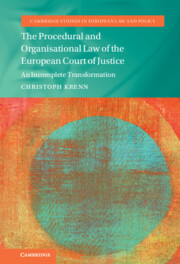Book contents
- The Procedural and Organisational Law of the European Court of Justice
- Cambridge Studies in European Law and Policy
- The Procedural and Organisational Law of the European Court of Justice
- Copyright page
- Contents
- Figures
- Preface
- Acknowledgements
- Table of Cases
- Abbreviations
- 1 Introduction
- 2 What Courts Do
- 3 On the Template of the ICJ
- 4 Luhmann in Luxembourg
- 5 Completing the Transformation
- 6 Conclusion
- Bibliography
- Index
2 - What Courts Do
A Normative Theory of Court Decision-Making
Published online by Cambridge University Press: 15 September 2022
- The Procedural and Organisational Law of the European Court of Justice
- Cambridge Studies in European Law and Policy
- The Procedural and Organisational Law of the European Court of Justice
- Copyright page
- Contents
- Figures
- Preface
- Acknowledgements
- Table of Cases
- Abbreviations
- 1 Introduction
- 2 What Courts Do
- 3 On the Template of the ICJ
- 4 Luhmann in Luxembourg
- 5 Completing the Transformation
- 6 Conclusion
- Bibliography
- Index
Summary
The first chapter of the book develops a normative theory of court organisation and decision-making. It provides the normative framework to assess the development and state of the ECJ’s procedural and organisational law. The chapter argues that the procedure and organisation of a court should depend on its role in a political system. To develop this argument, it presents three ideal models of court decision-making: a liberal model, a rule of law model and a democratic model. The liberal model is associated with the theoretical work of Christoph Möllers. He sees the role of courts as protecting individual liberty. The litigants need to be at the centre of the judicial process. The rule of law model, which I associate with Niklas Luhmann’s theory of the judicial process, sees the role of courts not so much in the service of the individual; rather it sees the judicial process as instrumental for creating normative stability by inducing acceptance for court decisions as authoritative interpretations of the law. Finally, the democratic model, that I associate with the theory of adjudication by Jürgen Habermas, conceptualizes courts as democratic organs of a political community. They need to connect to the will of a political community and aim for a procedure that embeds a court’s work in the public sphere.
Keywords
- Type
- Chapter
- Information
- The Procedural and Organisational Law of the European Court of JusticeAn Incomplete Transformation, pp. 10 - 25Publisher: Cambridge University PressPrint publication year: 2022

